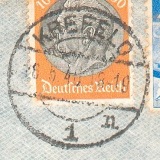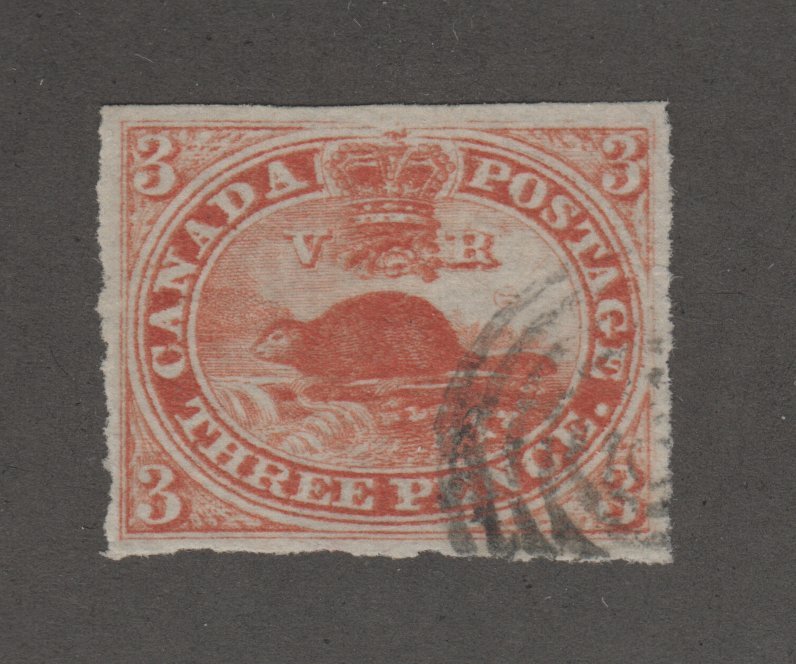by Steve Swain
11th of August 2013
Do you have stamps in your collection that obviously have had some sort of cancellation or marking applied to them but you can’t determine exactly what those markings are because they have faded or were applied lightly or applied with a hard to see color?
An inexpensive image discovery tool is available from retroReveal.org that just may solve your stamp mysteries. The site provides image processing that allows you to view a stamp in a variety of "color spaces", thus allowing hidden features of the image to be revealed. (This article is neither promoting the purchase nor use of retroReveal. The discussion is provided for awareness only.)

For example, the 5-cent U.S. Foreign Exchange revenue stamp to the far left below certainly shows some sort of cancellation, but it is very difficult to discern what it is. An image of the stamp processed through retroReveal clearly shows a datestamp of “CANCELLED / JUL 8 1887 / AMERICAN EXPRESS” as seen in the two color space images. (Images rotated for viewing.)



An exemplary confirmation of the value of image processing to reveal cancellations is the marvelous fancy cancellation made abundantly clear on the 2-cent Washington shown here. Two of the numerous color space choices generated for the original stamp image are shown.



How does it work?
When you upload a stamp image to retroReveal.org, the image will be processed and will allow you to view the stamp image in a variety of color spaces, thus allowing hidden features of the stamp image to be revealed. These color spaces, or models, provide a way to describe and understand colors in terms of a series of values, such as RGB (Red Green Blue) or CMYK (Cyan Magenta Yellow Black). The resulting processed images are shown in a black/white format, thus filtering out colors that obscure the hidden or difficult to see markings.
After processing your uploaded stamp image, it can be seen in the Channel Inspector with a variety of the color space modifications. Some color spaces provide no additional enhancement or understanding of the cancellation or marking. But some provide very convincing awareness of exactly what was hidden. In certain color spaces, even unsuspected features of the stamp may become starkly clear.
Examples of these seemingly hidden markings are illustrated with the below New Zealand stamps. For both the 9-pence and the 1-schilling stamps, it almost appears as if there are no markings on either stamp.


But after processing images of these two stamps through retroReveal, we see a very pronounced manuscript cancellation on the 9-pence stamp and an “APR 1904” datestamp on the 1-shilling stamp (image rotated for viewing).


As with the New Zealand 9-pence issue above, the cancellations on the 1-pound British South African and 4-cent U.S. revenue stamps below are almost impossible to discern due to the “incompatibility” of the ink color of the cancellation and the primary stamp color. But after processing the stamp images, their cancellations become abundantly visible.




Sometimes, the most revealing color space is the simple “negative” space as seen with the below stamps. The “MAY 7 1863” circular datestamp on the 50-cent U.S. revenue stamp and the “1720 3 -3 43” datestamp on the Algerian stamp are clearly visible after processing the images.




Lastly, cancellations on some stamps are embossed, not inked on. These 3-dimensional cancellations are extremely difficult to see without image enhancements. The “B.B & CO. / AUG 11 1863 / BOSTON” embossed cancellation on this 1-dollar U.S. Foreign Exchange revenue stamp is completely revealed after processing through retroReveal.


End Note
Although not designed solely for processing images of postage stamps, retroReveal can be an invaluable tool for any philatelist who desires a complete understanding of the seemingly hidden markings and features of their stamps.
For more information about using retroReveal, visit their website at http://retroreveal.org/. The site is hosted by the University of Utah's J. Willard Marriott Library.


